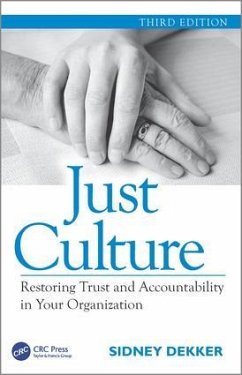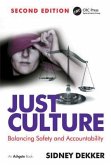A just culture is a culture of trust, learning and accountability. It is particularly important when an incident has occurred; when something has gone wrong. How do you respond to the people involved? What do you do to minimize the negative impact, and maximize learning? This third edition of Sidney Dekker's extremely successful Just Culture offers new material on restorative justice and ideas about why your people may be breaking rules. Supported by extensive case material, you will learn about safety reporting and honest disclosure, about retributive just culture and about the criminalization of human error. Some suspect a just culture means letting people off the hook. Yet they believe they need to remain able to hold people accountable for undesirable performance. In this new edition, Dekker asks you to look at 'accountability' in different ways. One is by asking which rule was broken, who did it, whether that behavior crossed some line, and what the appropriate consequences should be. In this retributive sense, an 'account' is something you get people to pay, or settle. But who will draw that line? And is the process fair? Another way to approach accountability after an incident is to ask who was hurt. To ask what their needs are. And to explore whose obligation it is to meet those needs. People involved in causing the incident may well want to participate in meeting those needs. In this restorative sense, an 'account' is something you get people to tell, and others to listen to. Learn to look at accountability in different ways and your impact on restoring trust, learning and a sense of humanity in your organization could be enormous.
Comments on previous editions: 'Readers interested in organizational ethics and decision-making will benefit from the case studies and examples. Summing Up: Recommended. Lower- and upper-level undergraduates; general readers.' Choice, February 2013 '...it is difficult to think of a more relevant and challenging book for health and safety practitioners, company managers and directors, regulators of all stripes, and members of parliament.' Safeguard, New Zealand, Jan/Feb 2013 'Sidney Dekker's book is a thought-provoking exposition of the concept of a just society. Would that we could achieve it! The questions that the author raises need to be discussed at all levels of government, and by judges and lawyers, and by ministers of health. Dekker makes it clear that profound changes must be made in both the legal and the medical systems if we really wish to improve medical safety.' John W. Senders, University of Toronto, Canada 'A timely book about the current major safety dilemma - how do we resolve the apparent conflict between increasing demands for accountability and the creation of an open and reporting organisational culture? Thought-provoking, erudite, and analytical, but very readable, Sidney Dekker uses many practical examples from diverse safety-critical domains and provides a framework for managing this issue. A 'must-read' for anyone interested in safety improvement, but also, one hopes, for politicians, law-makers and the judiciary.' Dr Tom Hugh. MDA National Insurance Ltd, Sydney, Australia 'With surgical precision Sidney Dekker lays bare the core elements of a just culture. He convincingly explains how this desired outcome arises from a combination of accountability and (organisational) learning. The real-life cases in the book serve to drive his arguments home in a way that will be easily recognised and understood by practitioners in safety-critical industries, and hopefully also by rule makers and lawyers.' Bert Ruitenberg, IFATCA Human Factors








